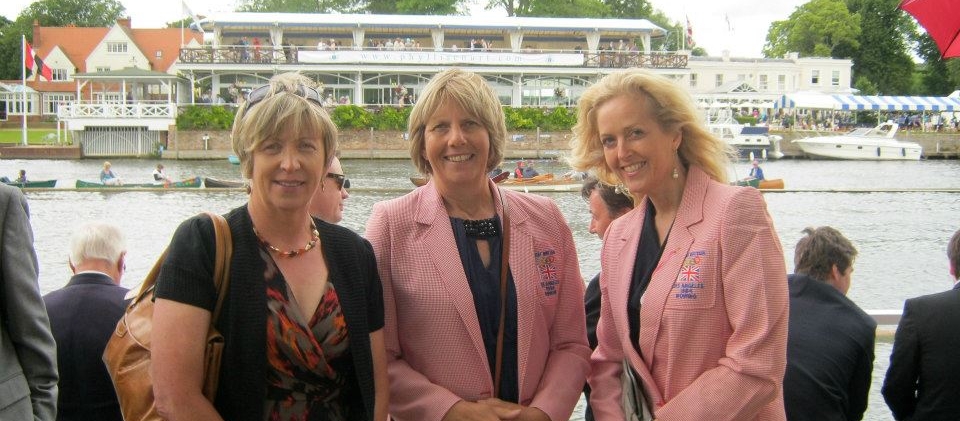| Years | 1975 World Championships (8o 10th) 1979 World Championships (8o 9th) 1983 World Championships (4+ 8th) 1984 Olympic Games (4+ 7th) |
| Clubs | Stuart Ladies RC, Civil Service Ladies RC, Thames Tradesmen’s RC, Lea RC |
| Height | 5’10¾” or 180 cm |
| Racing weight | 11 stone or 70 kg |
| Born | 1956 |
The photo at the top of this page shows Jean (centre) with Gill Parker (left) and Jo Toch at Henley Royal Regatta in 2012 when a celebration was laid on for all GB Olympic rowing team members. (Photo: Jo Toch’s personal collection.)
Getting into rowing
Jean first started rowing in 1973 at Stuart Ladies RC on the River Lea in east London when she was 16. She knew about the sport and the club from her older brother who was a member of Crowland RC, one of the men’s clubs there, and when Jean said she was interested in rowing herself, he mentioned to some of the other women and girls at Stuart Ladies that, “My little sister’s interested in coming down.” Imagining that she’d be a small girl, they were expecting someone who might cox, “So when I turned up and was taller than everyone else, they said, ‘Oh! You’re going to be quite useful,'” Jean remembers, laughing.
After a few introductory outings in a tub pair, Jean was soon rowing in a novice coxed four. “We did a few regattas and I thought it was absolutely fantastic, although I remember racing at the Welsh Harp and the boat was so far down on one side that the two of us on bowside were leaning out so far the wrong way and nearly washing our hair trying to get it level!”
She was then put in a junior coxed four. “Our coach, Alan Turner, decided that I should change to strokeside, and that sorted me out, and then he taught me how to row properly,” she recalls. The crew were delighted to get sponsorship from the actor Oliver Reed whom Jean thinks had been contacted by another member of the club who was a journalist. they used to it finance a new boat. “As a club at that time we didn’t have any boats of our own, and used to just borrow them from the men’s clubs,” she says, “So we got a brand new restricted boat which was lovely.”
The crew won the Junior Fours at the National Championships in July, in a photo finish. Although they were in their lovely new boat, “Everybody had ‘best’ [shell] boats, but we still won in the restricted, so that was quite something,” she remembers.

Stuart Ladies RC junior four in 1973. From left: Ann Cochrane, Jean, Toni Cann, and Gill Webb. Their cox was Sue Bailey. (Photo: Gill Parker’s personal collection.)
The following year, although they were still all junior, the four broke up for various reasons. Gill focused on sculling and Jean, who had started work in central London by then, just did a bit of pairing with Ann. “We did a few regattas, but nothing serious, so that was a bit of a wasted year,” she reflects, looking back at it now.
International career
In the autumn of 1974, Jean, Gill and Sue Bailey all joined the GB women’s squad, which was a big step up in training for them. The amount of travelling involved was particularly hard for Jean, who lived in Dagenham in Essex, with evening training in Paddington and then weekend outings at Hammersmith. “I’d go straight to the land training from work but I’d get home too late to have a proper dinner so I used to have my main meal at lunchtime,” she remembers.
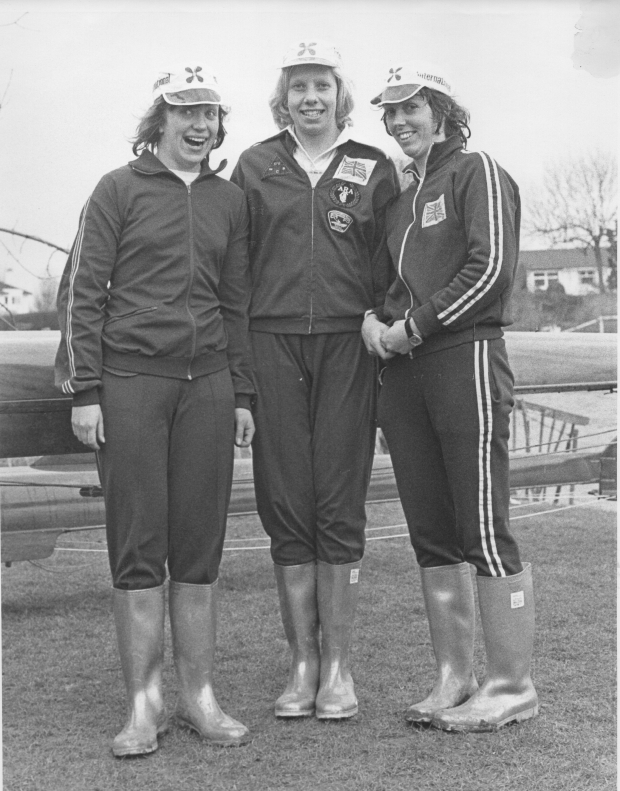
Jean (centre) with Gill Webb (left) and Diana Bishop in. (Photo © Patrick White.)
Although she was trialing as a sweep rower, the squad were encouraged to scull too, and both Jean and Gill were lent prototype aluminium sculling boats which they raced in at the Scullers’ Head. “I’d only been sculling about three times before that,” Jean remembers, adding, “And that’d been in a stable clinker boat, so I was just pleased to finish!”
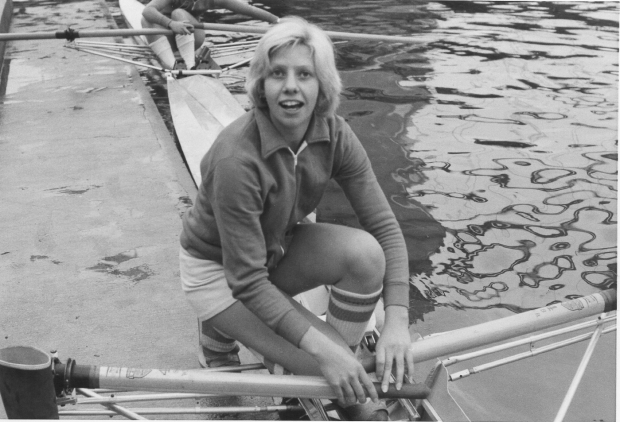
Jean boating for the 1975 Scullers’ Head. (Photo: Penny Chuter’s personal collection.)
Jean was selected to row in the eight at the 1975 World Championships in Nottingham, where she was one of three 18 year olds in the crew, and she went on to row for GB at the World Championships or Olympic Games on three further occasions over the following ten years.
Full details of the Jean’s international representation at the 1975, 1979 and 1983 World Championships and the 1984 Olympic Games can be found here:
1975 | 1979 | 1983 | 1984
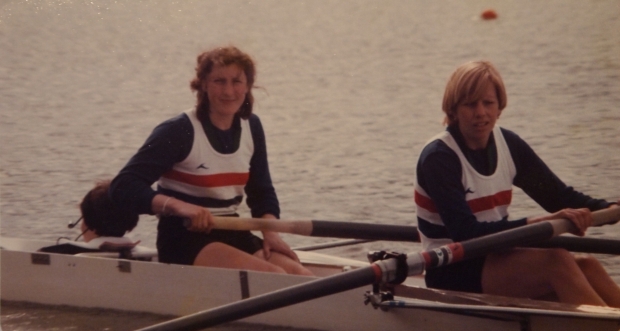
Tessa Millar (left) and Jean Genchi in the GB coxed four in 1984. (Photo: Tessa Millar’s personal collection.)
Intervening years
Between her four GB representations, Jean didn’t compete for a number of reasons. While some of these were her choice on the face of it, in most of these cases she would have preferred to have rowed but felt she had to withdraw because of management mistakes and decisions at a time when the athletes had no voice about what was going on, which meant that the most was not being made of her and other people’s rowing careers.
1976
The squad for the 1976 Olympics was both small and formed by invitation. By Christmas, Jean had been told that she was one of the ‘spares’, so she decided to leave the squad then in order to do other rowing instead. She formed a four with two of her crewmates from the 1975 eight – Sue Handscomb and Rosie Clugston – and 1974 international Chris Grimes, based at Civil Service where the others were all members. She and Sue also did a pair (they’d raced a pair internationally in 19975 at Ratzeburg), carrying their blades round to Thames Tradesmen’s RC where they borrowed a boat. “That was the best year!,” she says, as do the others. “We won about 20 pots. We trebled up at the Nationals where we won the four and came second in the quad. Sue and I went well in the pair too but unfortunately we lost by a little bit. We wanted to win that, but it was all good fun.”
1977 and 1978
Having got married in 1976, Jean decided not trial for GB for the 1977 season so that she could spend some time with her husband, Michael, who was a member of Gladstone Warwick RC, another of the River Lea clubs. Jean did some coaching back at the Lea that year, as well as rowing at Civil Service.
In 1978, the World Championships were in New Zealand, and the cost of sending crews there meant that there was never going to be an eight. After the trials at the end of the winter training season, Jean was given the option of continuing in the squad as part of a spare pair which might have raced as a second GB crew at some of the early season international regattas. Feeling that the selection of the four was not being done purely on boat-moving ability, Jean turned this offer down and instead joined up with three other former internationals who had not been selected – Clare Bayles, Yvonne Earl and Chris Grimes – to form a separate four. The frustrating and painful saga of how the rest of the season developed can be read here.
1980 to 1982
After competing in the eight in 1979, the first of the two years for which Dan Topolski ran the squad, Jean decided with regret not to continue for the 1980 Olympic year, at least partly because of the time and cost of the travelling involved as the group did a lot of their training at Thorpe Park near Heathrow whereas in previous years all the on-water work had been at Hammersmith. At the time, she felt in her own mind that that was the end of her international rowing career.
She kept herself “fit but not squad fit” doing land training at Lea RC which had been formed in 1980 from the amalgamation of Stuart Ladies and the River Lea men’s clubs, and coaching novices. She also bought a second hand Karlisch scull which, she remembers, “Was heavy, but was a great boat to learn in.” She didn’t race, and just enjoyed sculling for pleasure.
In 1981 she and Gill Webb (now Parker) did some double sculling together, but the following season Gill got a club four together with former junior internationals Clare Carpenter and Katie Ball, and someone else. “I can’t remember how it happened but maybe I finished up in the four one day because somebody couldn’t make it and I quite liked it! It was a really good club four.” As the boat went faster with her in it she joined them more permanently, and the crew had a successful season, winning at Metropolitan and Birmingham regattas and also racing in Amsterdam.
1983 (until a month before the World Championships)
Although Jean had enjoyed the four, she’d been reminded of the perennial issue with crew boats which is that they tend to involve quite a lot of hanging around waiting for other people to turn up. “It makes you want to go out in a single,” she laughs, adding, “And anyway, I thought it was about time I tried sculling properly after rowing for so long, and that’s what I did in 1983.”
She continues, “Sue’s husband Ian [McNuff] wrote me a schedule for the winter. It was a great schedule. I loved doing the work he put me to. I didn’t have a coach most of the time but I had my training plan and Michael and the dog used to run along with me. My goal was to get a good result at the Nationals, although I went to a few GB trials in my single.”
The final of the women’s singles, which had 19 entries that year, was closely fought for the silver and bronze medals behind the comfortable winner Beryl Mitchell, who was the GB sculler. Jean finished second behind her, 3.5 seconds ahead of Nonie Ray. “I raced Nonie several times during the season, and she had always been faster than me,” Jean says, “But for the Nationals, I borrowed a Carl Douglas boat from a friend, which made such a difference!”
“The three of us jumped the start because we were all so eager to get going,” Jean remembers, but after they restarted the three of them stayed more or less level for the first part of the race, before Beryl moved ahead. Jean remembers that the fact she was ‘unexpectedly’ (compared with previous races, thanks to her boat upgrade) up with Nonie put the other sculler under pressure, and this led to Nonie having steering problems near the end of the race when the two of them were battling for the line. “I just tried to keep my cool and made sure I steered properly. Then when Nonie hit the buoy and nearly fell in, I went through. I couldn’t believe my luck!”
Just a few days after this she got a call from the GB squad to ask if she’d join the four from which someone had dropped out. She did and raced a month later at the World Championships, doing better than expected. After not carrying on as a crew for most of the 1984 season the four eventually finished up back together again (apart from a change of cox) and competed at the Los Angeles Olympics.
1985
“I’d had a lot of back problems rowing, so after 1984 and I decided to go back to sculling because it was better for my back,” Jean remembers. She and her 1983/1984 GB team mate Kate Holroyd decided to do a double at the Nationals, although they only had a few weeks to train in this as Kate spent most of the year in France as part of her degree course. “As soon as she came back in June we got together, and we did a lot of training with the GB lightweight coxless four that Michael was coaching at Thorpe Park – it was brilliant doing pieces with them,” she says.
Jean and Kate dead heated for the gold medal with the GB lightweight double of Beryl Crockford and Lin Clark (who were also doing the lightweight event and went on to win at Britain’s first women’s gold medal at the World Championships a few weeks later). The two crews finished 45 seconds clear of the bronze medalists.
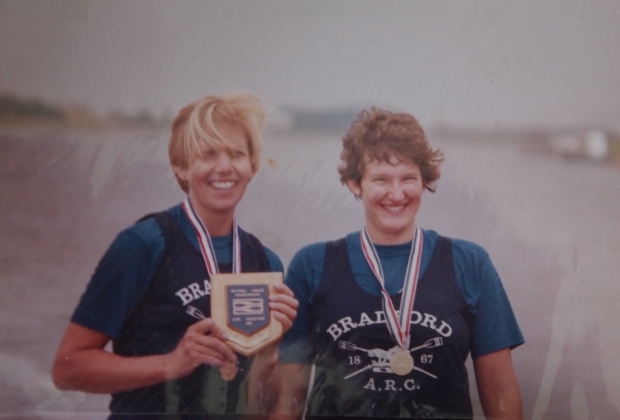
Jean (left) and Kate Holroyd: National Champions in Women’s Double Sculls 1985. (Photo: Jean Genchi’s personal collection.)
Jean was frustrated that having shown themselves to be the same speed as Lin and Beryl who had been tipped all season as serious medal prospects, they weren’t even considered for selections as the openweight double, especially as the Worlds were only in Belgium, so it was not particularly expensive to go there.
Feeling yet again that she was powerless against the system, Jean decided finally to stop rowing seriously and turned her attention to having a family instead.
